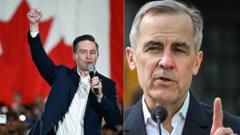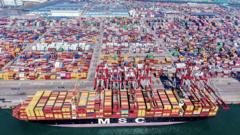In the lead-up to Canada's national elections, the spotlight has turned on Prime Minister Mark Carney, as he grapples with the implications of his past interactions with China. Once viewed as a valuable asset, Carney's experience in engaging with Chinese business and political spheres now raises questions about foreign influence in Canadian politics.
China's Influence: A Double-Edged Sword for Canadian Prime Minister Mark Carney

China's Influence: A Double-Edged Sword for Canadian Prime Minister Mark Carney
As Canada heads to the polls, Prime Minister Mark Carney's past ties to China become a contentious topic in the election debate.
During a recent debate, Carney identified China as a significant threat to Canada’s security, a surprising declaration given his history of working with Chinese businesses. His opponents have seized upon accusations that his administration has connections with pro-Communist Party factions, igniting a broader conversation about foreign interference in Canada. This scrutiny deepened following strained relations with China triggered by the arrest of a Chinese executive in 2018, a situation further complicated by ongoing geopolitical tensions. With the election approaching, Carney's past experiences could prove both a boon and a burden, highlighting the complexities of navigating international relations in a domestic political landscape.
As the election campaign unfolds, the electorate will closely scrutinize the candidates' stances on foreign relationships and national security, making Carney's ability to address these concerns pivotal for his reelection efforts.
As the election campaign unfolds, the electorate will closely scrutinize the candidates' stances on foreign relationships and national security, making Carney's ability to address these concerns pivotal for his reelection efforts.


















